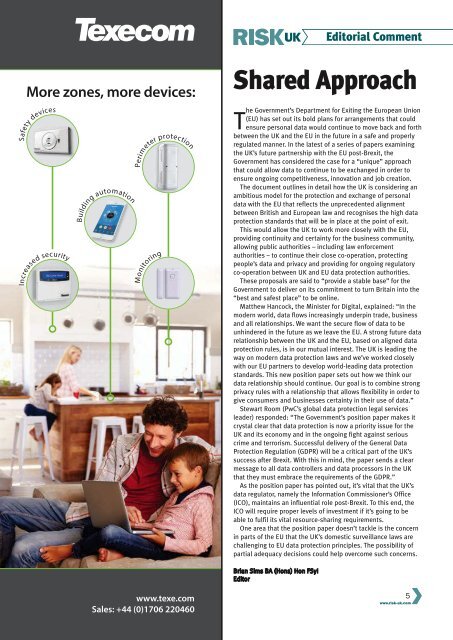RiskUKSeptember2017
You also want an ePaper? Increase the reach of your titles
YUMPU automatically turns print PDFs into web optimized ePapers that Google loves.
Editorial Comment<br />
More zones, more devices:<br />
Safety devices<br />
Increased security<br />
Building automation<br />
Perimeter protection<br />
Monitoring<br />
Shared Approach<br />
The Government’s Department for Exiting the European Union<br />
(EU) has set out its bold plans for arrangements that could<br />
ensure personal data would continue to move back and forth<br />
between the UK and the EU in the future in a safe and properly<br />
regulated manner. In the latest of a series of papers examining<br />
the UK’s future partnership with the EU post-Brexit, the<br />
Government has considered the case for a “unique” approach<br />
that could allow data to continue to be exchanged in order to<br />
ensure ongoing competitiveness, innovation and job creation.<br />
The document outlines in detail how the UK is considering an<br />
ambitious model for the protection and exchange of personal<br />
data with the EU that reflects the unprecedented alignment<br />
between British and European law and recognises the high data<br />
protection standards that will be in place at the point of exit.<br />
This would allow the UK to work more closely with the EU,<br />
providing continuity and certainty for the business community,<br />
allowing public authorities – including law enforcement<br />
authorities – to continue their close co-operation, protecting<br />
people’s data and privacy and providing for ongoing regulatory<br />
co-operation between UK and EU data protection authorities.<br />
These proposals are said to “provide a stable base” for the<br />
Government to deliver on its commitment to turn Britain into the<br />
“best and safest place” to be online.<br />
Matthew Hancock, the Minister for Digital, explained: “In the<br />
modern world, data flows increasingly underpin trade, business<br />
and all relationships. We want the secure flow of data to be<br />
unhindered in the future as we leave the EU. A strong future data<br />
relationship between the UK and the EU, based on aligned data<br />
protection rules, is in our mutual interest. The UK is leading the<br />
way on modern data protection laws and we’ve worked closely<br />
with our EU partners to develop world-leading data protection<br />
standards. This new position paper sets out how we think our<br />
data relationship should continue. Our goal is to combine strong<br />
privacy rules with a relationship that allows flexibility in order to<br />
give consumers and businesses certainty in their use of data.”<br />
Stewart Room (PwC’s global data protection legal services<br />
leader) responded: “The Government’s position paper makes it<br />
crystal clear that data protection is now a priority issue for the<br />
UK and its economy and in the ongoing fight against serious<br />
crime and terrorism. Successful delivery of the General Data<br />
Protection Regulation (GDPR) will be a critical part of the UK’s<br />
success after Brexit. With this in mind, the paper sends a clear<br />
message to all data controllers and data processors in the UK<br />
that they must embrace the requirements of the GDPR.”<br />
As the position paper has pointed out, it’s vital that the UK’s<br />
data regulator, namely the Information Commissioner’s Office<br />
(ICO), maintains an influential role post-Brexit. To this end, the<br />
ICO will require proper levels of investment if it’s going to be<br />
able to fulfil its vital resource-sharing requirements.<br />
One area that the position paper doesn’t tackle is the concern<br />
in parts of the EU that the UK’s domestic surveillance laws are<br />
challenging to EU data protection principles. The possibility of<br />
partial adequacy decisions could help overcome such concerns.<br />
Brian Sims BA (Hons) Hon FSyI<br />
Editor<br />
www.texe.com<br />
Sales: +44 (0)1706 220460<br />
December 2012<br />
5<br />
www.risk-uk.com

















